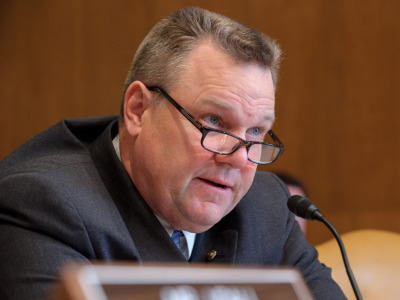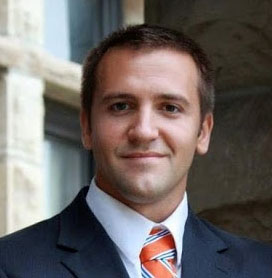Debates over whether farmers should be able to repair their high-tech machinery on their own that once raged in state legislatures are now spilling into the halls of Congress, the White House and courtrooms across the U.S.
The “right to repair” movement that began in independent automobile repair shops in the early 2000s has picked up momentum in the agricultural industry as producers and advocates insist manufacturers hold too firm a grip over the tools farmers and third-party mechanics need to repair high-tech farm equipment.
With the backing of major farm groups such as the American Farm Bureau Federation and the National Farmers Union, right to repair advocates have been shifting their focus toward federal action, finding willing champions in President Joe Biden and Sen. Jon Tester, D-Mont. Biden signed an executive order last July directing the Federal Trade Commission (FTC) to create new regulations preventing “unfair anticompetitive restrictions,” while Tester introduced a bill in February that would legally require agricultural equipment manufacturers to make their software, parts and tools information available to those looking to repair their machines.
“All we're asking them to do is to make available software or documentation so that a farmer can do his own diagnosis if a sensor were to go out or if there was a problem and the motor shut down,” Tester said in an interview with Agri-Pulse.
Right to repair has been a growing presence in courtrooms, too, as the world’s largest equipment manufacturer, John Deere, finds itself the subject of six different lawsuits accusing the company of monopolizing the repair market for Deere-branded machines with onboard central computers. National Farmers Union, joined by six state affiliates and five right to repair groups, has also filed a complaint with the FTC accusing Deere of violating the Sherman Act by “forcing all purchasers of Deere equipment to also purchase necessary repairs from Deere.”
 Sen. Jon Tester, D-Mont.But manufacturers like John Deere assert they already support a customer’s right to “safely maintain, diagnose, repair their equipment,” just not the software inside the high-tech machines. Deere, which declined to comment on the lawsuits and the complaint, told the FTC last year that giving farmers access to internal software would allow them to illegally tamper with safety and emissions controls, as well as infringe on the company’s intellectual property interests.
Sen. Jon Tester, D-Mont.But manufacturers like John Deere assert they already support a customer’s right to “safely maintain, diagnose, repair their equipment,” just not the software inside the high-tech machines. Deere, which declined to comment on the lawsuits and the complaint, told the FTC last year that giving farmers access to internal software would allow them to illegally tamper with safety and emissions controls, as well as infringe on the company’s intellectual property interests.
The resulting conflict, according to Penn State law professor Ross Pifer, pits the claims that both parties make over the software against one another.
“You have one piece of property and you have multiple entities that have an interest in that singular piece of property,” Pifer said. “How do you balance that?”
The FTC, tasked by Biden to limit corporate restrictions on independent repair, has two distinct powers when it comes to this issue. It can investigate companies for potential antitrust violations and, if it has reason to believe the law is being broken, either ask the company to sign an agreement to stop the practice or bring the case to court. It can also create its own rules restricting practices it deems “unfair or deceptive.”
The commission hasn’t made any announcement of any new rulemakings on the subject so far, but its members voted last July to ramp up their law enforcement efforts against repair restrictions. The agency can evaluate claims under the Sherman Act, which bans agreements that restrain competition, or the FTC Act, which prohibits companies from using unfair methods of competition or making willful attempts to monopolize.
The National Farmers Union complaint, which was filed last week, accuses John Deere of “tying,” or forcing consumers to buy two separate products in two different markets – in this case, farm machinery and repair services. The group claims this behavior violates the Sherman Act.
“Essentially Deere is leveraging its dominant market position, we believe, to monopolize a separate market, the repair market for its own products,” Aaron Shier, a senior government relations representative for National Farmers Union, told Agri-Pulse.
Shier said the organization is hoping the FTC will issue a cease and desist order or obtain an injunction from a federal court that would prohibit Deere from continuing to restrict repairs.
Betsy Lordan, an FTC spokesperson, told Agri-Pulse in an email that, to her knowledge, the agency has not brought any new right to repair cases since the agency’s July announcement.
Action could also come from Congress. Tester’s bill, the Agricultural Right to Repair Act, would require manufacturers to provide customers with “any documentation, part, software or tool required to diagnose, maintain, or repair their equipment.” If manufacturers were to violate the law as proposed, they’d lose the copyright and any patents relating to that product.
The bill would also require companies to give producers the means to enable and disable an electronic security lock, allow for interoperability between the equipment’s software and third-party software, and make sure parts are replaceable using commonly available tools. Additionally, the bill would grant FTC the power to establish additional regulations.
“In the end, I think we hopefully will get good bipartisan support for this bill,” Tester said. “If not, I think it really does put rural America at a big disadvantage.”
But Josh Evans, the vice president of government relations for the Equipment Dealers Association, worries if Tester’s bill were to pass as written, it would do more harm to local equipment dealerships than it would to manufacturers. His concern is that it would make it difficult for dealerships, particularly small ones, to make any money from selling parts — which currently account for about a third of their revenue, with the rest coming from equipment sales and service.
 Josh Evans, Equipment Dealers Association
Josh Evans, Equipment Dealers Association
Evans, who called the bill “nonsensical”, said he fears it will send more producers to manufacturers directly, cutting the dealer out of the process entirely.
“You might have two or three dealerships in a very rural remote population servicing several counties," he said. "If this bill passes, I question whether those dealers are going to be around."
The Association of Equipment Manufacturers — whose membership roster includes John Deere, AGCO and Case IH, among other familiar companies — also opposed the bill, calling it “a solution in search of a problem.”
“We are committed to helping farmers reduce downtime and maximize productivity,” the group said. “But this bill undermines important regulations that keep farmers safe and protect our environment.”
Tester’s bill, while solely devoted to agricultural equipment, isn’t the only piece of legislation proposed on the issue. Reps. Mondaire Jones, D-N.Y., and Victoria Spartz, R-Ind., introduced the Freedom to Repair Act, which would adjust the nation’s current copyright law to allow for diagnosis and repair of any product that required embedded digital electronics to function, with the exception of medical devices.
Federal courts will also have the opportunity to weigh in on the issue as six class-action lawsuits against John Deere make their way through district courts in Illinois, Alabama, Tennessee and Oklahoma. All six accuse Deere of monopolizing a market for repair and maintenance services, as well as engaging in group boycott, unlawful tying, and unjust enrichment.
Eric Artrip, one of the lawyers representing farmer Trinity Dale Wells in the Alabama case, told Agri-Pulse he believes John Deere’s control over the market for the company’s embedded software is putting it in violation of the Sherman Act. Citing a 2021 article from Ag Equipment Intelligence, Wells’ lawsuit argues that more than 91% of the independent dealerships that sell John Deere products are owned by a company with five or more ag stores.
“You have two different things going on,” Artrip said. “You have a dramatic decrease in the number of dealerships throughout the United States, and then you have the inability of customers to get their machinery repaired or service to anyone else besides those dealerships. That's what the Sherman Act is designed to address.”
On Feb. 25, Deere filed a motion requesting that all six cases brought against the company be transferred to the federal court in Chicago. While the company said it “vigorously disputes the allegations in the complaints,” it argued moving all the cases to one court would be more convenient for the parties, more efficient for the courts, and allow for the determinations to be made consistently.
Five of the six lawsuits, using identical verbiage, sought "an order requiring Deere to make the necessary software available, at a reasonable cost, to individuals and repair shops." All six plaintiffs also asked for permanent injunctive relief and for the company to pay for damages and attorneys' fees.
Artrip, the attorney for the Alabama farmer, said he expects John Deere to request dismissal of his case.
“They will almost certainly file a motion to dismiss the case and they will almost certainly do so in a way that tries to knock all the claims out,” Artrip said. “And then it's going to be up to us to convince the court that the Sherman Act was designed, or was passed, to address this kind of behavior.”
For more news, go to www.Agri-Pulse.com.


